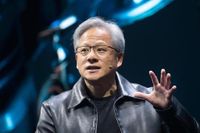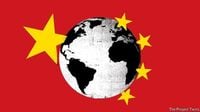Singapore's export engine is stalling as tariffs threaten growth prospects for 2025. With tariffs looming, Singapore's export forecast feels the pressure. Enterprise Singapore is preparing for turbulent times, ready to adjust its non-oil domestic exports (Nodx) expectations to meet unstable global conditions. A DBS Bank economist underscores this outlook, linking it to an equally reserved GDP growth prediction for 2025.
The concerns deepened when RHB Bank cut its full-year growth outlook to a stark 0%, down from a hopeful 2%, emphasizing considerable risks. Likewise, OCBC Bank has revised its Nodx forecast down to between -1% and 1%, a steep decline from the original 2% to 4% growth outlook. Initially, the trade agency had anticipated moderate Nodx growth of 1% to 3%, which now appears distant against these challenging backdrops.
For markets, tariff turbulence in global trade sends a cautionary signal across global markets. As tariffs pressure cross-border trade, industries dependent on Singaporean goods might encounter supply chain disruptions and added costs. Investors should monitor sectors and companies exposed to these changes, with both immediate responses and longer-term strategic shifts likely unfolding as trade dynamics evolve.
The bigger picture reveals that global economic forecasts are under strain. As major economies adopt protectionist trade measures, global economic patterns are set to shift. Singapore's revised growth forecasts act as a microcosm of broader macroeconomic challenges. Economists worldwide are vigilant, as alterations here may signal shifts elsewhere, influencing future policy decisions and global economic strategies.
In a separate yet interconnected development, Nvidia is facing a $5.5 billion charge after the U.S. government tightened export restrictions on its H20 AI chips sold to China. This significant financial impact was announced on April 15, 2025, and represents a substantial blow to the world’s leading AI chip manufacturer as it navigates the ongoing trade war between the United States and China.
The H20 chip has been one of Nvidia’s most popular products in China and is central to the company’s efforts to maintain a foothold in China’s booming AI industry. Chinese tech giants including Tencent, Alibaba, and ByteDance (TikTok’s parent company) had been ramping up orders for chips to meet growing demand for low-cost AI models, particularly from startups like DeepSeek.
According to Nvidia’s statement, the U.S. government informed the company on April 9 that the H20 chip would require a license to be exported to China, and on April 14 indicated these rules would remain in place indefinitely. The company’s shares fell approximately 6% in after-hours trading following the announcement.
While the H20 has lower computing capabilities than other Nvidia chips, its ability to connect to memory chips and other computing chips at high speeds is still high. Its attributes make the chips particularly useful for building supercomputers, which has been a key concern for U.S. export controls since 2022. The Institute for Progress, a non-partisan think tank based in Washington, supported the restrictions in a published essay, claiming Chinese firms were likely already using these chips to build supercomputer systems.
“At least one of the buyers, Tencent, has already installed H20s in a facility used to train a large model, very likely in breach of existing controls restricting the use of chips in supercomputers exceeding certain thresholds,” the group wrote.
The $5.5 billion in charges are associated with H20 products inventory, purchase commitments, and related reserves, according to Nvidia. The U.S. Department of Commerce, which oversees export controls, did not immediately comment on the situation.
In what appears to be a strategic response, Nvidia simultaneously announced plans to expand its U.S. manufacturing presence. The company revealed on Monday that it intends to build AI servers worth up to $500 billion in the United States over the next four years, partnering with manufacturers including Taiwan Semiconductor Manufacturing Co. (TSMC), Foxconn, and Wistron.
“Adding American manufacturing helps us better meet the incredible and growing demand for AI chips and supercomputers, strengthens our supply chain and boosts our resiliency,” said Jensen Huang, chief executive officer of Nvidia, in a statement on Monday.
Production of Nvidia’s latest generation AI chip, known as Blackwell, has already begun at TSMC’s new plant in Phoenix, Arizona. The company is also establishing supercomputer manufacturing facilities in Texas and chip packaging and testing operations in Arizona. The $500 billion investment figure represents the combined value of all the AI hardware Nvidia anticipates selling through its supply chain.
This significant commitment reflects the massive spending from cloud computing giants like Microsoft, Amazon, and Meta Platforms, which Bloomberg Intelligence estimates will, collectively, spend $371 billion this year on AI facilities and computing resources – a 44 percent increase from last year.
The Nvidia China export restrictions represent the latest chapter in the ongoing trade war between the United States and China. U.S. officials have consistently targeted advanced semiconductor technology as a key area of concern, working to prevent China from accessing cutting-edge chips that could enhance its military and artificial intelligence capabilities.
Almost immediately after previous export controls were implemented, Nvidia began designing chips that would come as close as possible to U.S. regulatory limits while still being legal to sell in China. The H20 chip was part of this strategy – designed to be less powerful than Nvidia’s most advanced offerings but still competitive, particularly for AI inference tasks where models deliver responses to users.
Inference capabilities are rapidly becoming the largest segment of the AI chip market, and Nvidia CEO Jensen Huang had previously expressed confidence in the company’s position to dominate this section of the market. However, the new restrictions threaten this strategy in the important Chinese market.
The restrictions come amid broader changes in U.S. trade policy under the Trump administration. Electronics manufacturers globally are adjusting to shifting tariff policies, with President Trump recently downplaying a Friday exemption on electronics as merely “a procedural step” in his broader push to revamp U.S. trade relationships.
Each Nvidia Blackwell chip costs tens of thousands of dollars, with servers containing these semiconductors priced in the millions. Even at such steep prices, $500 billion-worth of AI hardware represents a massive quantity of equipment – potentially hundreds of thousands of AI-oriented servers that will be manufactured in the U.S.
For the global AI industry, the Nvidia China export restrictions could have far-reaching implications. Chinese companies may accelerate development of domestic alternatives, while Nvidia’s U.S. manufacturing push could reshape semiconductor supply chains that have traditionally been concentrated in Asia. As tensions continue to rise between the world’s two largest economies, the semiconductor industry finds itself caught at the center of an increasingly-complex geopolitical chess game, with each move having the potential to shape the future of artificial intelligence development on both sides of the Pacific.






